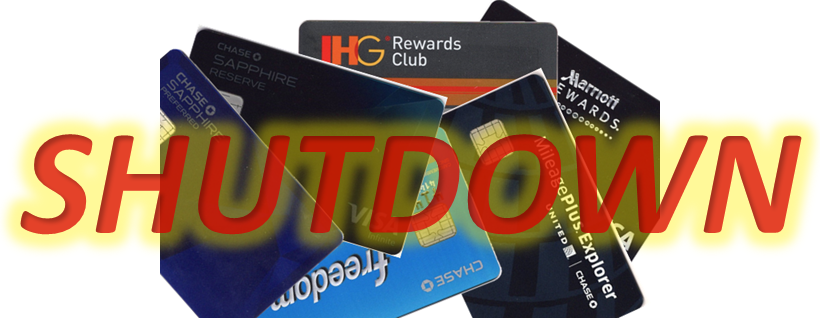NOTICE: This post references card features that have changed, expired, or are not currently available

Reports continue to trickle in from people who report that Chase closed down all of their accounts. This often happens soon after opening a new Chase card. Sometimes it happens after making a single very large purchase. Sometimes it seems to be triggered by an abrupt increase in spend overall.
When people ask Chase why they were shut down, Chase often refers to the large number of accounts they opened (not just with Chase) in the past year. Fortunately, Chase will sometimes review the decision and overturn it.
Why Chase shutdowns happen
This Reddit post offers a logical explanation for why Chase is shutting down accounts. The theory is that Chase is actively trying to avoid Bust-out Fraud. Bust-out fraud is where a fraudster builds up their credit with responsible credit card use and then suddenly runs up all of their balances before disappearing. This Experian white paper describes the bust-out process as follows:
…the fraudster builds up a history of good behavior with timely payments and low utilization. Over time, he or she obtains additional lines of credit and requests higher credit limits. Eventually, the fraudster uses all available credit and stops making payments. Overpayments with bad checks are often made in the final stage of the bust-out, temporarily inflating the credit limit and causing losses greater than the account credit limit.
The problem for credit card rewards enthusiasts is that our behavior patterns often look exactly like these bust-out fraudsters, with the exception of the final fraudulent bust-out activity (which we don’t do!).
The old (but still relevant) shutdown reasons
The Experian white paper asserts that lenders typically look for suspicious activities to identify bust-out behavior:
Examples of suspicious activities are frequent convenience checks; frequent cash advances; multiple payments within one billing period from different accounts and different sources; purchases from high-risk, high-value merchants; and unusual purchase amounts (e.g., $1,000 at a dry cleaner). Some issuers use these factors in models to predict bust-outs.
Those who heavily manufacture spend often exhibit many of the above listed behaviors. They are known to make multiple payments within one billing period, and they certainly make purchases in unusual purchase amounts. Those who have been manufacturing spend heavily for a while are used to getting shut down for these activities.
The new shutdown reasons
The Experian white paper goes on to argue that predictive bust-out scores can be computed entirely from credit data:
…Issuers that only utilize internal transaction and payment data see only account activities in their own organization…
Credit reporting data provides a perspective on how account holders behave across the credit spectrum. Behaviors such as credit line increases, new accounts, changes in utilization and balance growth can all be captured through credit reporting data. By generating a wider perspective, the bust-out predictors can be observed months before the bust-out is executed…
I think it is safe to say that Chase has bought into this argument. Whether or not they specifically use Experian’s bust-out scoring is irrelevant. It’s clear from many datapoints that Chase is using credit reporting data and that shut-downs are often triggered by some of the behaviors Experian described above (credit line increases, new accounts, changes in utilization and balance growth).
Summary of Shut-Down Causes
Your accounts can be shut down due to suspicious spending activity (on your Chase cards), or suspicious patterns on your credit report which is collected across all of your accounts (not just Chase accounts). Anecdotally it seems that applying for a new Chase credit card is one of the ways to ensure that Chase will evaluate you overall for suspicious activity.
Avoiding Chase shutdowns
The following advice is conjecture. I have no reasonable way to test this advice.
1. Keep your credit report clean
An ideal credit report shows a long credit history with no bad marks, few new inquiries, few new accounts, and a low credit utilization:
- Long credit history: Don’t cancel your oldest credit cards since closed accounts will eventually drop off your report. If you’re not using the cards anymore, product change them to no-fee cards and keep them alive with an occasional small purchase (some banks will close credit cards that have no activity after 6 months or so).
- Few new inquiries: When you apply for new credit cards, card issuers will submit a “hard inquiry” to one or more credit bureaus. Unlike the other factors here, inquiries are not automatically shared across credit bureaus. So, for example, your Experian report and Equifax reports will show different numbers of inquiries. Therefore, one way to limit inquiry damage when applying for new cards is to spread out the inquiries. Here are a few ways to accomplish that:
- You can use the Credit Pulls Database to figure out which report a bank is likely to pull from before you apply, and avoid applying to those that are likely to push your inquiry count too high.
- You can freeze the credit reports with high inquiry counts and ask the card issuer to pull from the report that wasn’t frozen (but they won’t always be willing to do so). Doctor of Credit has a useful post about this technique here.
- Often, applying for multiple cards from the same bank on the same day will result in only one credit inquiry on your credit report. So, if you’re going to apply for a card anyway, you can get more bang for your buck by applying for two. Our Best Offers page includes App Tips for each bank which indicate when the inquiries are combined.
- Few new accounts: Unlike inquiries, new accounts are usually shown on all three credit reports. The obvious way to limit the number of new accounts is to rarely sign up for new cards. Another option is to sign up for business cards which do not appear on personal credit reports. You can find our automatically calculated Top N list of business card signup offers here. Note that Capital One is an exception in that they do report business cards to the personal credit bureaus. Barclays does too… sometimes. It’s unclear when Barclays reports the cards and when they do not (if anyone has insight into this, please let me know!).
- Low credit utilization: Credit utilization is defined as the amount of credit available that you’ve used in a given month. For example, if you have $100,000 in available credit and you charged a total of $5,000 within a month, then your utilization is only 5% (which is good). Banks report credit used once per month to the credit bureaus, usually when your statement closes. You can keep your utilization down by paying off some or all of the amount owed before your statement closes. Keep in mind, though, that frequent intermittent payments can be a risk factor as well. Also note that some banks report utilization on different schedules (see this Doctor of Credit post for more).
2. Keep your Chase card activity clean
As a reminder, Experian noted these suspicious activities: “frequent convenience checks; frequent cash advances; multiple payments within one billing period from different accounts and different sources; purchases from high-risk, high-value merchants; and unusual purchase amounts.” That leads us to these obvious recommendations:
- Avoid convenience checks and cash advances: You should avoid these anyway. You won’t earn rewards from these cash advances, but you will have to pay fees and interest.
- Avoid multiple payments within one billing period from different accounts and different sources: Try to pay your Chase credit card bills from a single source and make just one or two payments per month. If you are doing heavy manufactured spend that requires cycling your credit limit daily, then I recommend doing so with a different bank besides Chase. Pick one where you don’t mind getting shut down.
- Avoid purchases from high-risk, high-value merchants; and unusual purchase amounts: This one is a bit tougher in that we don’t know which merchants Chase considers to be high risk / high value. But it is clear that a sudden flurry of large repeated purchases will look suspicious. So, if you insist on using your Chase cards to buy gift cards, I recommend ramping up slowly over time. A sudden jump in spend of this type will look suspicious.
3. Avoid signing up for new Chase cards if your credit report already looks suspicious
Chase continues to have many of the best signup offers, so I would never say to avoid Chase cards altogether. However, if your credit report shows a large number of recent inquiries and new accounts, you may want to hold off. At least consider the risk when debating the pros and cons of getting a new Chase card.
Bottom Line
Chase has been shutting down accounts due to suspicious card activity and credit activity. Reviews seem to be triggered, in part, by applying for new Chase cards. Having too many new accounts on your credit report is a clear risk factor. Unfortunately, we don’t know how many accounts is too many. Nor do we know why some accounts are reinstated after review and others are not. Hopefully following the recommendations given in this post will keep you safe.





does anyone know if asking for DECREASING THE LIMITS on existing accounts, Chase AND elsewhere, might help? Or hurt?
Thanks all
I’m new to the hobby. Quick question: What happens to your Ultimate Rewards points if they close your accounts? Do you lose them prior to having a chance to transfer them to Hyatt/United/Etc.? Thanks.
You have 30 days to use/transfer them.
Credit Pulls Database link above needs updated. -Jason
Fixed. Thanks!
Chase approved me for $32,000 line of credit with a Chase Sapphire Reserve. I used it one time and they put a hold on my card. I called in finally after waiting 2 hours on the phone and verified all of my information. The next day they cancelled the card. I make over 20 times the amount
of the credit line, no late payments, payoff my credit cards before the end of the month (even made 1 payment on this card), and was told I have too much credit and too many inquiries with in a certain period (Didn’t they know this before I got the card?) All in all their excuses were all lame and I am thinking as soon as the courts open to sue them just to see what happens.
I felt as though this would damage my credit and wanted Chase to remove it from my credit report. I am thinking about suing Chase for damaging my credit. I went through extensive verification and qualification to get the card and now that it has reported on my credit report they closed the account down for no reason. I am hearing a bout this from other individuals and if Chase feels as though people who pay on time and make a significant income (My income was not affected by Coronavirus) then I do not wish to do business with them in the future.
Talking to the lady on the phone while verifying my account I felt negative vibes the entire time. I explained I was attempting to make a $1,200.00 purchase and she told me that was too much for a new card. By the time I got off the phone I asked whether she was going to remove the block on my card. She stated she need to get me off the phone in order to do it. The next day my account was closed.
They are very arrogant and you get the sense that they do not value their customers at all. Jamie Diamond, CEO of JPMorgan Chase, is the real culprit behind the attitude of his employees. I talked to one of their customer service reps and told them I would be serving Mr. Diamond a civil action lawsuit if I was not told the reason for the closure of my account. They cited too many applications and too much credit lines. Appealing will get you no where. They will cite that the application for the credit cards states that they can cancel for any reason (Good or Bad faith). Finally I got a call from one of their supervisors and she insinuated that my account may be fraudulent (after reading the above article now I see why she felt that way) even though I have no late payments. I do pay y credits cards off weekly to avoid affecting my FICO score by keeping my debt to income ration law.
These people are ridiculous and I will not be doing business with them in the future and I would not recommend this card to anyone. American Express Platinum and Master Card Black are just as good or better.
MY ADVICE:
Concentrate on building business credit. it is much more rewarding.
Chase is notorious for closing accounts. I am done doing business with them and I think a lot of people should stop trying to conform to this corporation’s overreach. As far as I have good credit and financially sound, I can buy anything I want and apply for cards as much as I want, they can decline the cards, no problem. Freedom is being able to spend your money however way you want without worrying about account closure. Chase and Wellsfargo already on my blacklisted banks.
Sorry for what you went through, and I agree that Chase handled this poorly.
I’d will also mention, though, (as someone who has worked in customer service for a long time) that telling a customer service rep that you’re going to sue the company is completely meaningless. People say they’re going to sue all the time. We actually would rather you sue, then the lawyers have to handle it (not the reps.)
If you’re going to sue, just do it.
How did the law suit go?
[…] on any one issuer’s card(s) as this is a common trigger for account shut downs. Also see Why Chase shutdowns have increased and how to avoid them. This may become even more relevant in a […]
I wake up to a savings account and no checking account, and have to wait for a cashier’s check to get my funds from my old checking account. Wow!!!!!
[…] being approved for a second new account. I’d recommend exercising some caution on that (See: Why Chase shutdowns have increased and how to avoid them) — two applications in close proximity appears to be one of the triggers that has led to some […]
I just got all of my accounts at Chase closed “Freedom (13 years), Marriott (6 years), Amazon (3 years), Southwest (3 years), Disney (2 years). Pretty tough pill to swallow. Although I had been MS pretty hard the last year or so. Companion passes multiple years, high Marriott Status, free annual passes at Disney etc… Do you think I am banned for life from Chase? Or do you think it is 6 months? Year? 2 years? 5 years? I believe I got closed because Bank Of America also shut down 5 cards of mine earlier this month. I suspect it showed up when Chase did a credit pull.
Have you ever heard of someone able to open new accounts with either Chase or BOA after being closed?
Good questions. I don’t know if or when you’ll be able to apply again. Anyone else have data on that?
Please tell me I’m paranoid so I can apply for the CSR… and maybe the Hayatt. With all the chase shutdown stories I’ve been reading to make sure I avoid the wrath of Chase I’m getting gun shy. I’ve got a really good thing going right now, and I’d be fine without them…. but I also reeeally want the CSR and maybe even the Hyatt. Am I dumb for apply for one or both right now? I really don’t want them looking into my spending habits on their business products… I’m taking full advantage of the bonus categories.
US bnk Flex 4/2017 (before I knew anything about points)
Some dumb US bank line of credit that is still on my report 4/2017
CIP 4/2018 (Business)
Amx Blue 4/2018 (business)
Freedom 4/2018
Ink Cash 9/2018 (business)
Amex Gold Bus 10/2018 (business)
Utilization ~ 0%
Credit score is high 776ish
Debt (student loans, mortgage, 2 cars) is less than 2x my annual income
Credit from chase is equal to only 22% of my income (3% if you count just personal)
I feel like I could apply for both and be just fine, but man, I’m also doing fine if I just stay as is
Personally I’d go for it in your situation, but it’s impossible to say how risky it is.
My wife and I both have the Aviator business card, and it isn’t reported on either of our credit reports. I only applied for this card upon reading about similar datapoints about this card and its reporting.
[…] As is the case with most Chase personal cards, the new cardmember bonus is not available to you if you have received a welcome bonus on this card in the past 24 months. This card is not subject to the Chase 5/24 rule (it will add to your 5/24 count, but the rule is not applied in approval decisions for this card). That said, keep in mind that shut downs have increased a bit this year and a new Chase account has precipitated shut downs in some instances if a customer opens a new Chase account after opening many other new accounts in the past year (See: Why Chase shutdowns have increased and how to avoid them.) […]
[…] people in the points and miles hobby, but there has been a good deal of talk about elevated lending risk from various banks over the past six months or […]
Someone please help me. I’ve been a very loyal customer to chase and out of nowhere they shut me down. They informed me that they will not tell me the reason and no one will ever tell me the reason. I have a recording of this. They were extremely rude. I’ve always paid on time and haven’t opened a card with them in the last 6 months… any legal action possible? They gave me no heads up.
Call and ask them to review your case. Many have had the shutdowns reversed this way
Shutdown’s are not only with Chase. I had shutdowns with Bank of America and Barclay last year. Luckily that happened after I already got the signup bonus.
[…] Greg the Frequent Miler recently posted an explanation on why these shutdowns are happening. Chase is trying to fight what is called bust out fraud. Fraudulent people where building credit by paying their bills on time and keeping their utilization low. Slowly, they were able to build up trust by banks and getting approved for high credit card limits. Then they ran up high balances and disappeared. […]